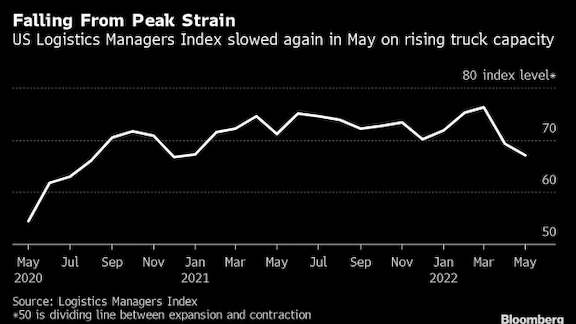A gauge of supply-chain pressure in the U.S. economy fell to the lowest level since December 2020, as activity such as trucking cools from elevated levels with few signs yet of a worrying collapse.
The Logistics Managers Index dropped to 67.1 in May, the second straight decline from a record of 76.2 reached in March. Faster gains in warehouse and inventory costs offset slower moves in transport prices.

The inventory growth rate slid for a third month from February’s all-time high, while transportation capacity expanded for a second month after contracting for much of the past two years in a tight trucking market.
“We are still observing a healthy rate of growth in transportation, but one that pales in comparison to the unsustainable growth rates observed in 2021,” according to the report.
With more trucking capacity came transportation costs that slumped to the lowest level since June 2020 while staying well within expansion mode, indicating that while prices are still increasing, “the intensity is much lower and is now approaching levels last seen two years ago.”
“Fortunately, in a world of bottlenecks, transportation seems to be opening back up,” the report said, adding that the survey showed continued expectations for price increases over the next year.
Warehousing and inventories “continue to grow at a similar pace to the one we have observed over the last 18 months, with inventory levels that are “unseasonably high, packing warehouses to the gills and driving costs up for both inventory and warehousing.”
Several academic institutions compile the LMI using a diffusion index where 50 is the dividing line between expansion and contraction.







